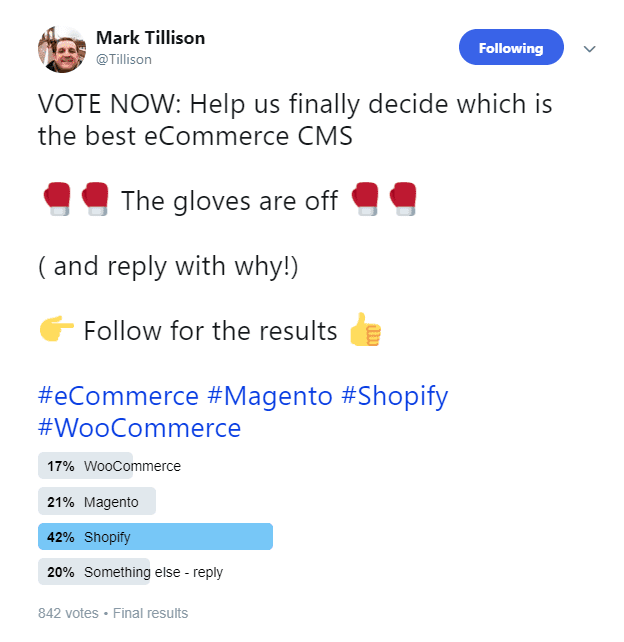The results are in. We recently ran a poll to ask Twitter what is their favourite eCommerce CMS. The replies weren’t as obvious as we anticipated, and it made for some interesting reading.
Back in 2016, we asked leading industry experts the same question. Their responses back then were just as varied but perhaps for different reasons. This time we have taken the question to you. Will opinions differ between experts from three years ago to primary eCommerce users today?
While Shopify came out on top by a long margin, the discussions that followed proved that people are as divided on this topic as the nation is on Brexit – well, almost.

What the Twitter poll did show us is that the reasons why people prefer one eCommerce site over another is down to many reasons.
Let’s look at the top two on the poll as an example.
Twitter’s favourite eCommerce CMS
Shopify came in with 42% of the vote, double that of the runner up Magento.
According to Shopify & You, as of 2019, the platform has over 820,000 merchants. It has also handled over $41 billion (yes billion) of transactions within the last year alone, making it a not so small fish.
The trend since its inception back in 2004 shows a healthy continuous growth of both merchants and customers year on year. Users of Shopify have referred to its simplicity to use and operate and how this often outweighs its limited or restricted features.
The market leader
But compared to Magento’s statistics, Shopify isn’t at all the market leader. In research undertaken by Hostingtribunal.com, Magento handled $151 billion in transactions in 2018 – more than triple that of Shopify.
It’s favoured by top brands like Ford, Land Rover, Christian Louboutin and many, many more. It’s also held the #1 spot on the Internet Retailer 1000 List for four years now, while also having 1% of the internet itself powered by Magento.
You might be thinking that 1% isn’t anything to shout about, but factoring in that there are an estimated 1.6 billion websites, that means that around 16,000,000 are powered by Magento.
On paper, Magento is the bigger, more successful eCommerce platform. Usually, in the tech world, the market leaders also are the public’s preferred options as they have the cash flow to invest in functionality and usability more than most. But according to our poll, it’s dwarfed by the preference for Shopify.

Why isn’t Magento top of our poll?
The answer to this isn’t simple or clear. You could argue that Shopify is favoured by small- and medium-sized businesses as it is quick to set up generally easy to use. It’ll be these business owners who directly manage the eCommerce site and who are therefore using both Twitter and Shopify. Tech may not be their strong point and they may favour the easy option over the more labour intensive, even if the results would be more beneficial.
You could compare it to walking instead of driving a short distance. Walking is better for you, the environment and your wallet, but driving is quicker, easier and requires less effort. A similar mentality comes when business owners decide which platforms to use.
Yes, both are ultimately achievable options to getting somewhere, but sometimes you just want to do it fast with minimal input. Following this logic, you can see why the Twitter community seems to be swayed in the other direction against what the market research indicates. That’s not to say that users of other platforms aren’t on Twitter, but perhaps there’s a higher percentage compared to the others.
Magento, on the other hand, is the bigger beast, winning the favour of the top brands out there. But unlike Shopify, it isn’t as user-friendly to the average person. You may need to read a few guides or have a little technical knowledge behind you. The process of setting up your online store may not be as straightforward and may need a few tweaks to perfect it. This would be why it’s favoured by the bigger companies as well as the tech-savvy. It allows for higher levels of customisation and modification while also offering more features. Depending on what package you go for, you’ll find Magento will likely be on the premium end of any list; but with the extra cost does come extra functions.

What about the others?
And then there’s WooCommerce. The results from our poll placed it in last with only 17% of votes.
The discussions seem to reflect that WooCommerce, although coming in as fairly decent in our opinion poll, is more of a middle runner. It lacks Shopify’s simplicity and Magento’s perks and functionality. It does offer a more balanced approach and allows users more control than Shopify but less than Magento. Perhaps it’s destined to forever be trapped between the two or maybe it’ll take them on in its own right. According to Twitter, the community isn’t entirely hopeful over its place.
What really got us interested is, how different Twitter seems to reflect the statistics. We were learning of new platforms and tools we have never heard of from Twitter users who proudly prefer them. Perhaps there just is no ‘Better eCommerce CMS’ and it is all just down to personal preference and business needs.
If simplicity and user-friendliness is your thing great, Shopify seems to be the obvious choice. And if you need to get your hands a little dirty with the building and structuring of your eCommerce site then Magento may suit you.
Shopify and Magento appear to be at both ends of the spectrum. This spectrum literally contains hundreds of brands in between, each offering something different from the other. Where you choose to settle is down to you, but don’t take our word for it or that of Twitter. Find the one that suits you most.
Here at Tillison, we provide a range of eCommerce services such as WooCommerce, Shopify SEO and CRO for eCommerce.








